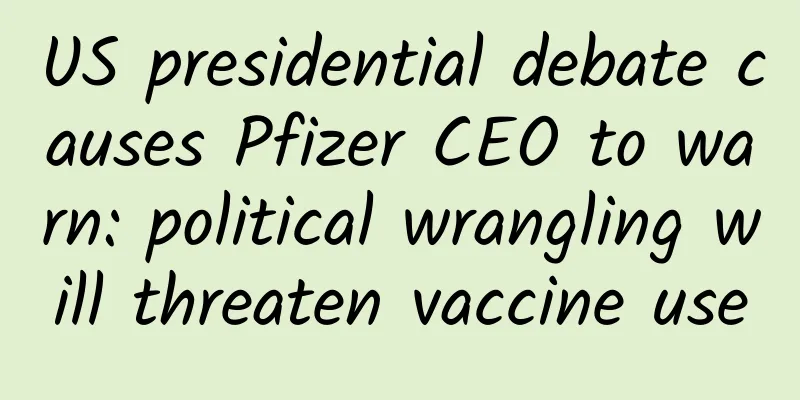US presidential debate causes Pfizer CEO to warn: political wrangling will threaten vaccine use

|
In the face of the new coronavirus pandemic, it is a tragedy not to have a vaccine; it is another tragedy for a vaccine to be ineffective or ineffective; it is an even greater tragedy for a vaccine to be proven effective but the public does not dare to believe it. Compiled by Xiaoyu and Idobon Pfizer CEO Albert Bourla said Pfizer will not be influenced by politics and will not "take shortcuts" in vaccine development. In a few weeks, the first phase III clinical trial data of the COVID-19 vaccine developed by Pfizer Pharmaceuticals may be released, which will undoubtedly give a shot in the arm to the global population trapped in the epidemic. However, Pfizer CEO Albert Bourla published an open letter last week, warning that the political pressure on the vaccine is getting more and more serious as it gets closer to success. The open letter stated that Pfizer began to develop vaccines quickly in the early stages of the COVID-19 pandemic and mobilized all resources to achieve its goal. Pfizer has invested $2 billion in vaccine research and development and expects to report early efficacy data later this month. However, "in a year of extremely fierce partisan competition, some people want us to move faster, while others advocate delaying progress." “Neither of these options is acceptable to me,” Bourla said. On September 29, US President Trump and Democratic presidential candidate Biden debated the vaccine development process and the issue of "politics influencing scientific decision-making." Bourla said he found it "disappointing" that the two used political rhetoric rather than scientific facts when discussing COVID-19 prevention. In order to cope with the severe threat of the new coronavirus, many pharmaceutical companies have started to develop vaccines early. Pfizer and its partner BioNTech quickly conducted early research and advanced to the Phase III clinical trial in July. It is expected that by the end of October, it will know whether the vaccine is effective. But the study was conducted during the U.S. presidential campaign, and President Trump has repeatedly said he expects a vaccine to be available by the end of the year or earlier. Concerns that politics could interfere with the progress of vaccine development have affected public trust in vaccines. A recent Pew survey showed that if a new coronavirus vaccine was available now, only 51% of Americans would choose to get the vaccine, while 49% would not get it, and more than three-quarters (78%) believed that the vaccine development process would be moved too fast. Just before the presidential debate, a group of scientists jointly wrote a letter to Bourla [1], stating that "science-based, rigorous safety standards" are crucial to vaccine development, and requested Pfizer to wait until the end of November to obtain more data on safe use of the drug - that is, after the volunteers received the second dose of the vaccine, before submitting an emergency application to the FDA. Bourla wrote in the open letter that the lethality of the new coronavirus and humanity's urgent need for vaccines are driving Pfizer to "move at the speed of science," and the company will not be influenced by politics and "will never take shortcuts." “The only pressure we feel — and it’s heavy — comes from the hundreds of millions of people, millions of businesses and hundreds of government officials who rely on us.” "I appreciate vigorous policy debates, but I'm not a politician. I'm a scientist, a business leader, a husband, a father, a friend and neighbor to many people, and I care deeply about whether future vaccines are reliable. Right now, a lot of political rhetoric is surrounding vaccine development, research progress, and political achievements, which are undermining public confidence in vaccines. I can't predict when our vaccine will be approved by the FDA, or even if it will be approved. But I know that if we stop talking about when the vaccine will be delivered from a political perspective and focus on rigorous, independent scientific evaluation and a firm, independent approval process, the world will be a safer place." Bourla asked people to imagine that if we had a safe and effective COVID-19 vaccine, but the presidential debate made people mistrust the vaccine - this would be a more complicated tragedy. “This is unacceptable to any of us,” he wrote. References [1] https://aboutblaw.com/TnB This article is translated from https://www.fiercepharma.com/pharma/pfizer-ceo-bourla-warns-about-politics-threatening-coronavirus-vaccine-uptake |
<<: Can steamed sea bass be eaten overnight? When is the best season to eat Songjiang sea bass?
>>: What is the difference between sea bass and freshwater bass? How to gut sea bass
Recommend
What causes pain in the breast
A normal person may feel slight pain in the middl...
How much water is needed to brew instant coffee? How to brew instant coffee to make it taste good?
Instant coffee is a dry coffee extract obtained b...
[Medical Q&A] How long does it take for sunscreen to become invalid after it is opened?
Planner: Chinese Medical Association Reviewer: Ya...
What is the standard blood sugar level for pregnant women?
Every parent is particularly eager for the arriva...
100 days after delivery, lochia comes and goes
After a woman gives birth, lochia will be dischar...
Mobvoi and Dianping reach strategic cooperation to provide mobile voice search technology to the latter
Beijing time, August 14, Mobvoi, China's lead...
Talk about the pros and cons of caesarean section
I believe that expectant mothers must be particul...
What are the symptoms of enlarged and painful nipples?
In daily life, women often feel their nipples bec...
How to treat iron deficiency anemia? Five steps
Iron is one of the important trace elements neede...
What does it mean to be circled while running? Why do black people run faster?
Running is a common sport that is good for the bo...
5 fruits to eat after miscarriage to help your body recover
Miscarriage is very harmful to a woman's body...
Is it okay to have a second child at the age of 40?
Is it good for a woman to have a second child at ...
What should women pay attention to in healthy living?
Many female friends sometimes complain that they ...
When to do internal inspection?
Internal examination can only be done when pregna...









